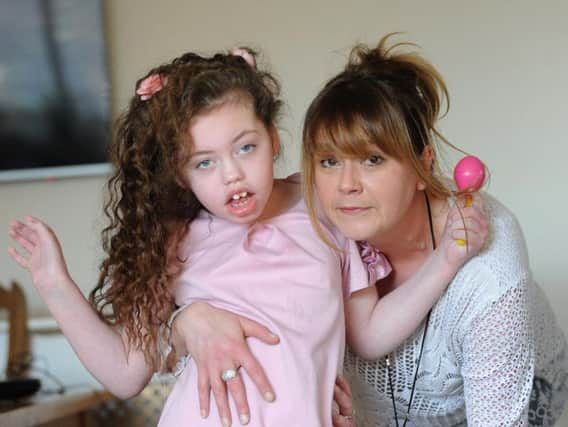Leyland mum says daughter, 9, given 'death sentence' over decision to stop funding specialist treatment


Matilda Moffatt, from Leyland, has Batten Disease, a rare genetic disorder which robs sufferers of their sight, mobility, speech, and often leads to death by the age of 12.
She is currently on a trial with an American pharmaceutical company where Cerliponase Alfa - an enzyme replacement - is injected into her brain, but when this comes to an end next year, the NHS will not be able to continue with the treatment.
Advertisement
Hide AdAdvertisement
Hide AdNICE, a government body which decides which drugs and treatments are available on the NHS in England, said a lack of long-term effectiveness means the treatment was not “value for money”.
It costs more than £500,000 per person for each year’s treatment.
Matlila’s mum, Melanie, said: “I thought that the NHS was meant to save lives, but the NHS have said my daughter should die.
“They have put her on a death sentence.”
Matilda was the first child in the UK to start the pioneering treatment in 2014, aged four. Melanie added: “She was the start of it all, her and three other children in Germany.
Advertisement
Hide AdAdvertisement
Hide Ad“It has given Matilda a quality of life, it has really slowed the progress down. Children with this condition normally have a lot of seizures, but her last big one was in February 2014.
“I truly believe that if she wasn’t on this medication, she wouldn’t be here. It’s rapid and I managed to catch her in time and get her on the trial. But the NHS have said no to treatment.
“She went through the danger period and it was successful. Now it’s been licensed and it being given in other countries but not in ours. I’m more than disappointed, when I found out about the decision, I threw up.
‘I’m scared that when the trial ends in 2020, what’s the future for my daughter? NICE England have shut the door on us. They talk about value for money, but how can you put a price on a child’s life?”
Advertisement
Hide AdAdvertisement
Hide AdMelanie said Matilda, a pupil at Mayfield School in Chorley, is blind, but is able to enjoy listening to Peppa Pig, songs by Emeli Sande, having her feet massaged, and dancing Gangnam Style.
She added: “She has a very naughty streak, she’s a little rum ‘un.
“We take every day as it comes, you get into a routine and you get hope going down to London and having the treatment.
“But when you get news like this, it hits you, it overwhelms you. You start grieving because of the thought of losing her.
Advertisement
Hide AdAdvertisement
Hide Ad“It’s like my daughter’s life is in someone else’s hands. I’m angry that I have no choice over what treatment she gets, it’s been completely taken away.”
Melanie praised the doctors at Great Ormond Street Hospital, where Matilda receives her treatment, and will be challenging NICE’s decision.
She has written to South Ribble MP Seema Kennedy and MP Matt Hancock, Secretary of State for Health.
What do NICE say?
The decision by NICE comes at the end of year-long negotiations between the pharmaceutical company and NHS England.
Advertisement
Hide AdAdvertisement
Hide AdNICE said the company “was unable to price the treatment at a level that would have addressed the problems highlighted during NICE’s assessment of it.”
Meindert Boysen, director of the Centre for Health Technology Evaluation at NICE, said: “Given the significant burden this disease places on children with the condition and on their parents and carers, and the subsequent negative impact this can have on the quality of their lives, anything that can help to improve treatment is to be welcomed.
“We and NHS England have been very clear with the company about what would be needed in order for us to be able to recommend cerliponase alfa. However, despite being given ample opportunity to come up with a workable solution, regrettably the company has not been able to do so.
“The committee concluded that it is not possible within the NHS to manage complex components of the confidential commercial arrangement proposed by the company.
Advertisement
Hide AdAdvertisement
Hide Ad“Once these elements are excluded, the cost-effectiveness estimates for cerliponase alfa are far higher than NICE normally considers acceptable for highly specialised technologies. We are therefore left with no alternative but to conclude that cerliponase alfa cannot be recommended as a cost-effective use of NHS resources.”
What is Batten Disease?
Batten Disease is the common name for a range of rare, fatal, inherited disorders of the nervous system.
These genetic mutations disrupt the cells’ ability to dispose of wastes. Cells are thrown out of balance with the build-up of proteins and lipids (fats).
Most forms of Batten disease usually begin during childhood. Children with the disease often appear healthy and develop normally before they begin to show symptoms.
Advertisement
Hide AdAdvertisement
Hide AdCommon symptoms for most of the forms include vision loss, seizures, delay and eventual loss of skills previously acquired, dementia, and abnormal movements.
As the disease progresses, children may develop one or more symptoms including personality and behaviour changes, clumsiness, learning difficulties, poor concentration, confusion, anxiety, difficulty sleeping, involuntary movements, and slow movement.
Over time, affected children may suffer from worsening seizures and progressive loss of language, speech, intellectual abilities, and motor skills.
Eventually, children with Batten disease become blind, wheelchair bound, bedridden, unable to communicate, and lose all cognitive functions.
Advertisement
Hide AdAdvertisement
Hide AdApproximately three to four children are diagnosed with a juvenile form of the disease each year, meaning there are probably between 30 – 40 affected children and young people in the UK.
The Background:
Melanie first became concerned about Matilda just before her second birthday, when she noticed she was slow to learn certain things and her speech was delayed.
She then began having seizures at three years old, and was diagnosed at the age of four.